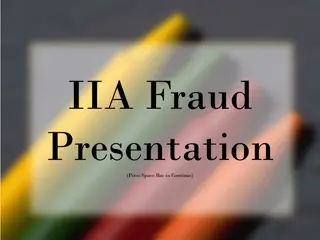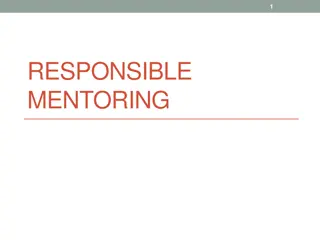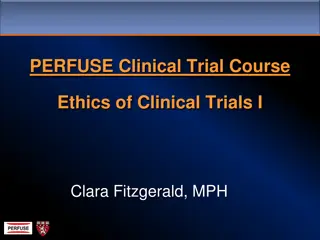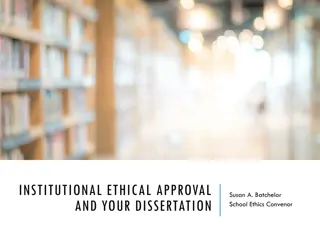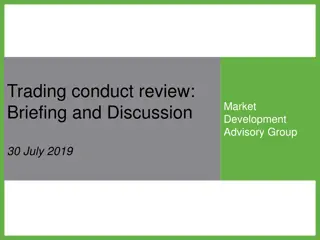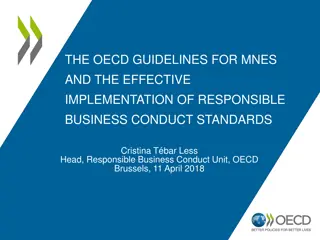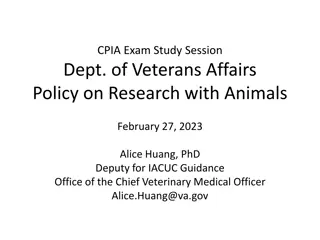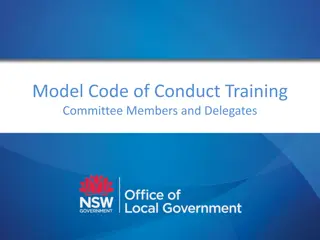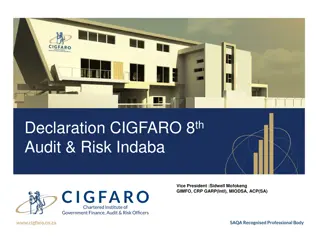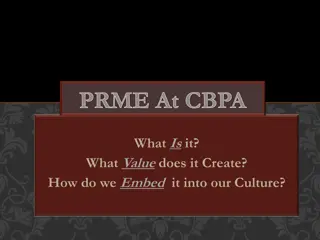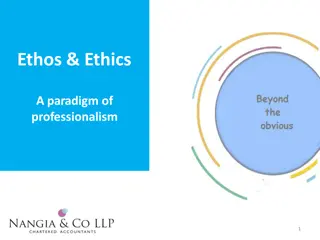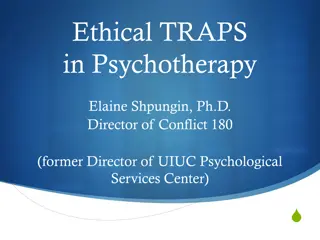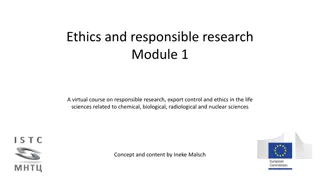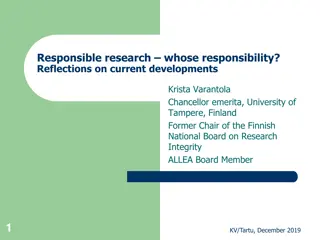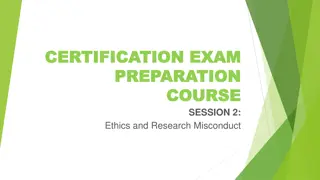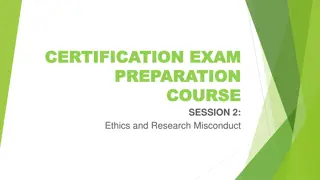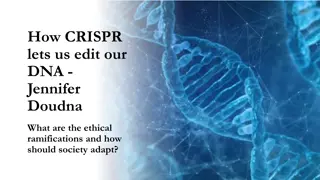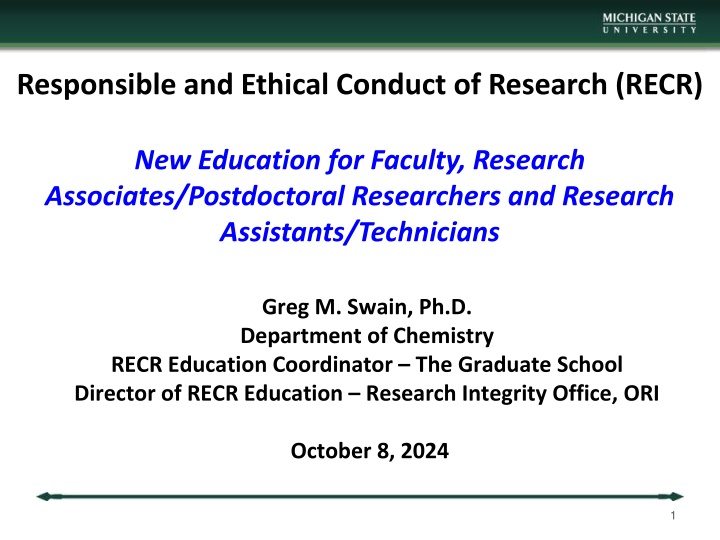
Responsible and Ethical Conduct of Research Education
This overview delves into the RECR education program for faculty, research associates, and postdoctoral researchers. It covers the principles, goals, and reasons behind implementing such a program to ensure responsible and ethical conduct in research activities.
Download Presentation

Please find below an Image/Link to download the presentation.
The content on the website is provided AS IS for your information and personal use only. It may not be sold, licensed, or shared on other websites without obtaining consent from the author. If you encounter any issues during the download, it is possible that the publisher has removed the file from their server.
You are allowed to download the files provided on this website for personal or commercial use, subject to the condition that they are used lawfully. All files are the property of their respective owners.
The content on the website is provided AS IS for your information and personal use only. It may not be sold, licensed, or shared on other websites without obtaining consent from the author.
E N D
Presentation Transcript
Responsible and Ethical Conduct of Research (RECR) New Education for Faculty, Research Associates/Postdoctoral Researchers and Research Assistants/Technicians Greg M. Swain, Ph.D. Department of Chemistry RECR Education Coordinator The Graduate School Director of RECR Education Research Integrity Office, ORI October 8, 2024 1
Provide an update on the planned RECR education program for new faculty, research associates/postdoctoral research assistants/technicians. researchers, and Phase in at onboarding starting fall 2025. Build upon new education requirements recently implemented on campus awardees). (NSF and USDA-NIFA 2
What is RECR Education? RECR stands for responsible and ethical conduct of research. RECR refers to a set of principles and best practices for conducting research, scholarship and creative activities with the utmost ethical standards (honesty, transparency and accountability). objectivity, integrity, RECR is about more than just compliance with policies and regulation. Instead, it entails research/scholarship behavior and represents a call-to-arms to protect the integrity that is the essential basis of unimpeachable scientific investigation. (National Engineering and Medicine, 2017). a full range of ethical Academies of Science, Dooling and Thompson, Acoustics Today 16 (2020) 89 3
Reasons for an RECR Education Program RECR comprehensive technicians in all disciplines. education should be a component faculty, of a training program for PDs, and Educating all faculty (and others) engaged in research and scholarship about best practices with a foundation in ethical behavior/decision making and effective mentoring is a proactive step to help protect MSU against bad behaviors and actions (i.e., ensure research integrity). Responsible confidence in scientific knowledge and progress for the public good. Federal Requirements and ethical conduct promotes public 4
Goals of RECR Education Program Increase knowledge of issues conduct of research, scholarship and creative activities. surrounding the responsible Improve ability to make ethical and legal decisions in the face of conflicts involving scientific research and creative activities (ethical awareness). Core values: transparency and accountability. honesty, objectivity, integrity, Develop an appreciation for accepted (best) practices conducting research, scholarship (practical aspects). for and creative activities Learn about the regulations, policies, and guidelines that govern the conduct of federally-funded research. 5
New Federal Regulations Chips and Science Act 2022 NSF - Provide RECR education to postdoctoral researchers, and other senior personnel. NSPM-33 Implement a research security program that includes the four elements: Cybersecurity Foreign travel security Research security training Export control training faculty, (1) Mentor training and mentorship; (2) Training to raise awareness of potential research security threats; and (3) Federal export control, disclosure, and reporting requirements. Rollout: May 15, 2024 (NSF) Rollout: July 22, 2024 (USDA-NIFA) Education should include: Goal: To protect America s national security while promoting openness in the research community. Phase I rollout: October 1, 2024 6
Government Requirements COMPETES ACT 2007 / CHIPS and Science Act 2022 National Science Foundation (NSF) All undergraduate and graduate students as well as postdocs supported on grants must be provided with RECR training. Now expanded to include faculty. Institution responsible for content, method of delivery and frequency of training. New subject matter mentoring relationships, security threats and export controls National Institutes of Health (NIH) Training grant awardees (K and T awards) individual or institutional grants. Must include face-to-face discussions plus other modes of delivery (e.g., on-line modules). At least 8 contact hours required. Education required at each career stage or at least every four years. Topics: research misconduct and detrimental research practices, mentor-mentee relationships, research ethics, conflicts of interest, authorship and plagiarism, data management, human subjects, animal use, lab safety and peer review. Research Security. 7
Government Requirements COMPETES ACT 2007 / CHIPS and Science Act 2022 USDA (National Institute of Food and Agriculture (NIFA)) Training required for all program directors, faculty, postdocs, graduate and undergraduate students. Institution responsible for content, method of delivery and frequency of training. 8
Faculty RECR Education Program Discussion-Based Workshops CITI On-Line Modules Introduction to RCR (RCR-Basic) Mentoring Environments (RCR-Basic) Authorship (RCR-Basic) Plagiarism (RCR-Basic) Data Management (RCR-Basic) Research Misconduct (RCR-Basic) Effective Mentoring and Mentor- Mentee Relationships Research Misconduct Detrimental Research Practices Authorship and Plagiarism Research Security and International Collaborations and Healthy Research and (Each module is ca. 30 min. To be completed within first 6 months of hire.) (Synchronous virtual sessions, 1 h ea. To be completed within first 24 months of hire.) Refresher education will be required every four years for only faculty. This will involve refresher CITI modules on some of the topics listed above. Documentation through Office of Research and Regulatory Affairs (ABILITY) at https://ora.msu.edu/train/. Tracking by the Research Integrity Office. 9
Research Associate/Postdoctoral RECR Discussion-Based Workshops CITI On-Line Modules Introduction to RCR (RCR-Basic) Mentoring Environments (RCR-Basic) Authorship (RCR-Basic) Plagiarism (RCR-Basic) Data Management (RCR-Basic) Research Misconduct (RCR-Basic) Effective Mentoring and Mentor- Mentee Relationships Research Misconduct Detrimental Research Practices Authorship and Plagiarism and Healthy Research and (Each module is ca. 30 min. To be completed within first 6 months of hire.) (Synchronous virtual sessions, 1 h ea. To be completed within first 12 months of hire.) No refresher education will be required. Documentation through Office of Research and Regulatory Affairs (ABILITY) at https://ora.msu.edu/train/. Tracking by the Research Integrity Office and Office of Postdoctoral Affairs. 10
Research Assistant/Technicians RECR CITI On-Line Modules Introduction to RCR (RCR-Basic) Mentoring and Healthy Research Environments (RCR-Basic) Authorship (RCR-Basic) Plagiarism (RCR-Basic) Data Management (RCR-Basic) Research Misconduct (RCR-Basic) (Each module is ca. 30 min. To be completed within first 6 months of hire.) No refresher education will be required. Documentation through Office of Research and Regulatory Affairs (ABILITY) at https://ora.msu.edu/train/. Tracking by Research Integrity Office 11
Research Security Training The training consists of two mandatory modules: Research Security Resources at MSU (slide deck) Manage and Mitigate Risk (~50-minute video) Phase I rollout: October 1, 2024 (NSF and USDA-NIFA awards) To be completed within 60 days of enrollment. Documentation through Office of Research and Regulatory Affairs (ABILITY) at https://ora.msu.edu/train/. Tracking by the Research Integrity Office. 12

